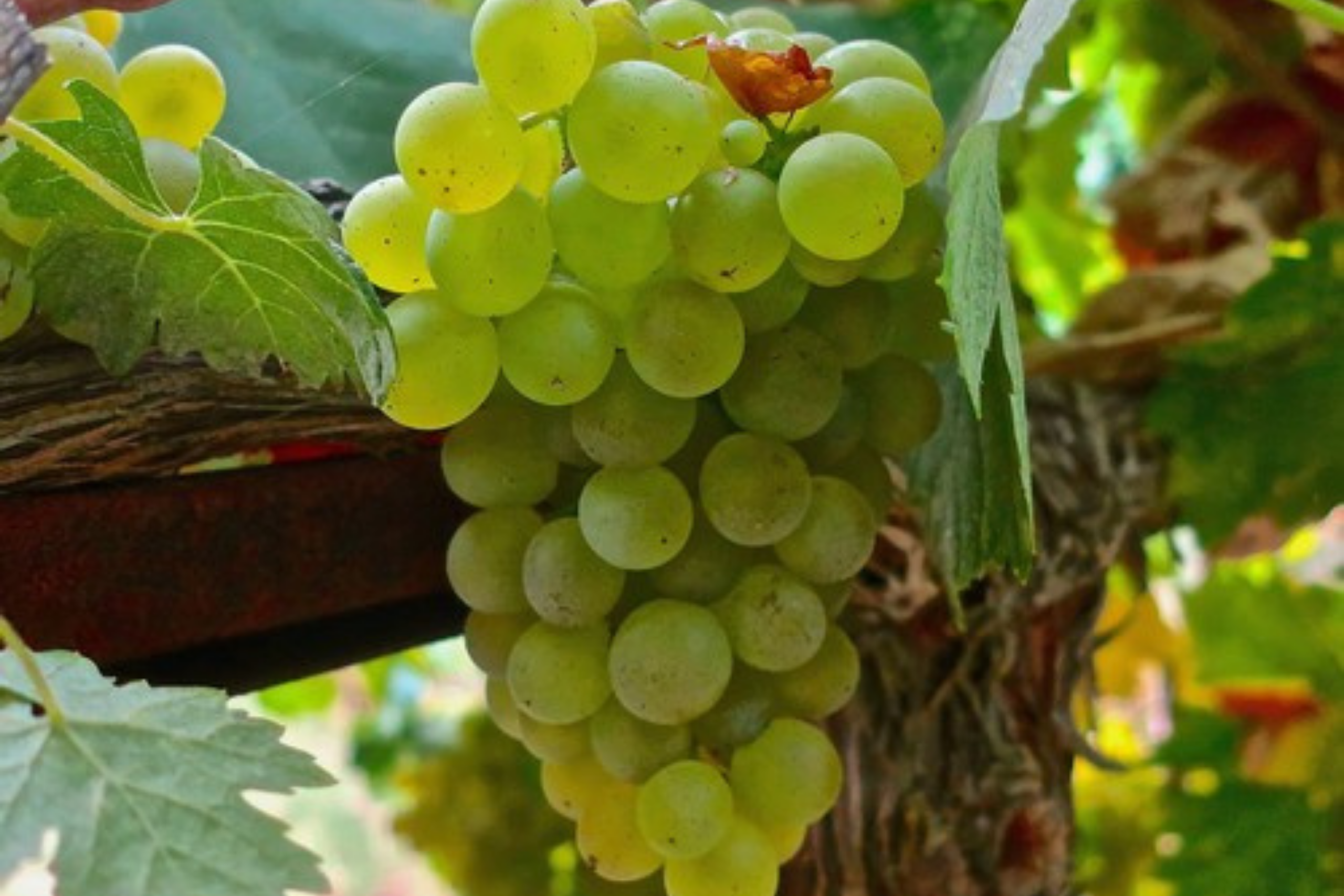MONDAY, OCTOBER 23, 2023. BY RANDY CAPAROSO.
Featured Image: Vermentino regeneratively grown by Vino Farms in Lodi’s Clements Hills AVA for AVIVO Wines.
Ridgely Evers—called “Ridge” by friends, family, and colleagues—is excited by the two latest releases under his AVIVO Wines label:
- 2022 AVIVO Ledbetter Family Lodi White ($20), crafted entirely from Vermentino grapes grown on an ultra-sandy riverbend bench site in Lodi‘s Clements Hills appellation.
- 2021 AVIVO Ledbetter Family Lodi Red ($20), consisting almost entirely of Sangiovese (with a smattering of Syrah) grown in even deeper sandy loam soils typifying the river banks on the east side of Lodi’s Mokelumne River AVA.

Mr. Evers, who owns the Healdsburg, Sonoma County-based DaVero Farms & Winery, has moved away from varietal identification on his AVIVO labels for primarily the following reason: He is making an aggressive pitch for the veracity of responsible farming; something affixed prominently on the front labels of the AVIVO wines as “Regenerative Farmed.”
Also on the labels, the farming method shares equal billing with the fact that the wines are grown by Lodi’s “Ledbetter Family.” The Ledbetters own Vino Farms, one of the region’s largest and most important winegrowing management companies.

Ridgely Evers in Vino Farms’ Biodynamic-grown Vermentino block.
Everything the Ledbetters grow is certified by LODI RULES for Sustainable Winegrowing. For Evers’ AVIVO wines, however, Vino Farms VP/Partner Craig Ledbetter goes one step further, farming his family’s Vermentino and Sangiovese blocks under Biodynamic Certified guidelines set by Demeter USA.
Why Biodynamic? There are tons of literature on this specific type of organic farming. Its methods are considered somewhat controversial in some quarters of the winegrowing industry. For Evers, the significance of Biodynamics is that it is, as he puts it, “the highest form of regenerative farming, going well beyond organic.”

Vino Farms’ Craig Ledbetter with Vermentino harvest. Mr. Ledbetter currently serves on the Lodi Winegrape Commission’s Grower Marketing Committee.
For Evers, this ties in with the growing concerns of many wine consumers who are looking for more than just good wines; they also want healthier wines, that benefit the health of the entire planet. Explains Evers:
“If a farm is healthy, the crops are, too… The techniques of Biodynamics—composts, cover crops, farm-sourced amendments, beneficial insects, nominal tillage, and diversity—all support Nature by building soil health and organic matter, which fosters biodiversity, improves water-holding capacity, and naturally sequesters carbon.”

In addition, according to Evers, this approach to farming also eschews glyphosate (RoundUp®). AVIVO, says Evers, “is one of three American wine brands that are certified to be free of glyphosate residue.”
There is also no doubt in Evers’ mind that this particular type of conscientious farming also produces higher-quality wine. The latest AVIVO Vermentino-based White is, he says, “taken to a whole new level… fabulous nose, rich mouthfeel, great acid.” The AVIVO White, in fact, is crisp, mouth-watering, and dry as a bone, combining a fleshy texture with refreshingly light, stony, citrusy qualities. Adds Evers, “I continue to believe that Vermentino is one of California’s intended varies, and our 2022 stands in strong testament to that belief.

Biodynamic farmed Sangiovese in Vino Farms’ River’s Edge Vineyard in Mokelumne River-Lodi AVA.
Like the AVIVO Vermentino-based White, the AVIVO Sangiovese-based Red defies obsolete misconceptions that intensely sun-soaked Mediterranean climate regions such as Lodi’s only produce fat, heavy wines. The AVIVO Red is bright and pure in high-season cherry perfume and flavor, couched in an upbeat, zesty medium body. Evers loves that it is “incredibly food-friendly… I’ve even had it with butter-poached Dover soul, which it rocked!”
I asked Evers to expand on his penchant for grapes such as Lodi-grown Vermentino and Sangiovese. He says:
“I am increasingly convinced that grape varieties from the Mediterranean are better suited to California’s Mediterranean climate than those from Northern France. The wines are nuanced, friendly, approachable, and spot-on. Our core thesis is that the best wines are made at the intersection of three things:
- Climate-appropriate varieties so that the plant and fruit are in balance.
- Regeneratively grown (ideally Biodynamically) so that the ecosystem is in balance.
- Made with minimal intervention—basically, by Nature.

Sangiovese night harvest in Vino Farms’ River’s Edge Vineyard.
With respect to the third factor, all AVIVO wines are native yeast fermented and crafted with minimal handling in the winery and oak influence. Hence, the acknowledgment of Ledbetter Farms is front and center on the labels. On the back labels, Evers also lists “Ingredients.” For the AVIVO Red, for instance, the list reads Regeneratively grown grapes and a touch of SO2 at bottling. That’s it.
Vino Farms’ Craig Ledbetter has been equally excited about the AVIVO project, telling us:
“Our work with Ridge and his team has been nothing but top-notch. The relationship has already led us to other ventures together. We are now partnering with Ridge and [AVIVO winemaker] Dan Fitzgerald in Elevation Wine Company.
“Biodynamic farming of these Italian varieties really has us thinking differently about how we will farm going forward in Lodi. We are now transitioning a substantial amount of acres to Biodynamiic or other forms of organic and regenerative farming. We will have many other varieties available in the coming years being farmed this way. Our employees are on board with this transition as well, which only helps us push this along faster than we expected.”

Vino Farms’ riverbend Vermentino block in The Bench Vineyard, Clements Hills-Lodi AVA.
Evers reiterates that this partnership with Vino Farms has been tantamount to “challenging conventional wisdom about what kinds of grapes really belong in California.
“California’s climate is not at all like that of the regions of Northern France, where the five varieties that constitute over 93% of the winegrapes grown in California originate.
“Our farmers practice a regenerative approach that considers each farm to be a living organism and leaves it stronger and healthier with every passing season. It’s better for the farm, better for the farmer workers, better for the planet—and it makes for healthier wine, which is better for you.”

Solar panels in Vino Farms’ Grand Vin Lands.
Randy Caparoso is a full-time wine journalist who lives in Lodi, California. Randy puts bread (and wine) on the table as the Editor-at-Large and Bottom Line columnist for The SOMM Journal, and currently blogs and does social media for Lodi Winegrape Commission’s lodiwine.com. He also contributes editorials to The Tasting Panel magazine, crafts authentic wine country experiences for sommeliers and media, and is the author of the new book “Lodi! A definitive Guide and History of America’s Largest Winegrowing Region.”
Have something interesting to say? Consider writing a guest blog article!
To subscribe to the Coffee Shop Blog, send an email to stephanie@lodiwine.com with the subject “blog subscribe.”
To join the Lodi Growers email list, send an email to stephanie@lodiwine.com with the subject “grower email subscribe.”
To receive Lodi Grower news and event promotions by mail, send your contact information to stephanie@lodiwine.com or call 209.367.4727.
For more information on the wines of Lodi, visit the Lodi Winegrape Commission’s consumer website, lodiwine.com.
For more information on the LODI RULES Sustainable Winegrowing Program, visit lodigrowers.com/standards or lodirules.org.


